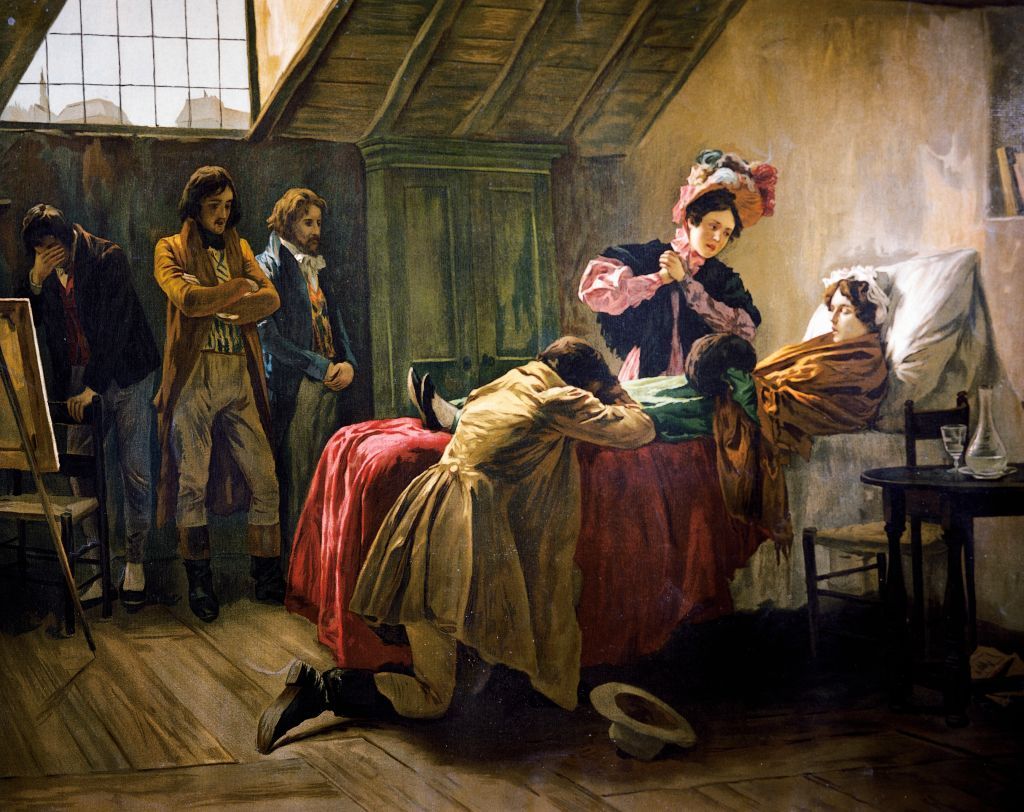I Got Whooping Cough So You Don't Have To
Cases of whooping cough, or pertussis, have risen sharply this year. Here's how to protect yourself and others from this nasty disease.


When I contracted whooping cough a few years ago, I thought there must have been a mistake. Surely this antiquated disease couldn't still be active in the 21st century? But what started as a two-week respiratory illness developed into "paroxysmal" coughing fits — episodes of such intense coughing they can cause broken ribs. And I was sick for almost three months.
Don't get me wrong. I have always loved a dramatic disease. As a child, I treasured the stories of heroines who died from illnesses so rare in modern times that they seemed exotic. Besides Beth succumbing to scarlet fever in "Little Women," it seemed like consumption, or tuberculosis, got all the glory. Mimi in "La Boheme," Satine in "Moulin Rouge" and Ruby Gillis in the "Anne of Green Gables" books all coughed posies of blood into their handkerchiefs.
With no tragic literary heroines, whooping cough needs a publicist. It is roaring back this year upon a public that still believes pertussis is a thing of the past. Protecting yourself with a vaccine booster every 10 years is easy. And if you are around babies who haven't finished their course of vaccines, it's especially important to get vaccinated.

Sign up for Kiplinger’s Free E-Newsletters
Profit and prosper with the best of expert advice on investing, taxes, retirement, personal finance and more - straight to your e-mail.
Profit and prosper with the best of expert advice - straight to your e-mail.
What is whooping cough?
Whooping cough is a highly contagious respiratory disease caused by a bacterium. Until the 1940s, when a pertussis vaccine was developed, about 9,000 U.S. children died of whooping cough every year. Nowadays, up to 20 babies die each year from the disease.
Children, especially babies who are not fully vaccinated, face the greatest risk from whooping cough. They are unable to cough productively and may need hospitalization due to complications like apnea, seizures or pneumonia. If you plan to be around babies or small children, it's important to take precautions for their sake as much as yours. And if you have asthma or are older or immunocompromised, you should also take care.
What are the symptoms of whooping cough?
From my experience, whooping cough is one of the most miserable illnesses you can contract as an adult. It's almost impossible to sleep when you have paroxysmal coughing, leaving you gasping for air and with aching ribs. And the illness seems to go on forever, which is why it is nicknamed "the 100-day cough."
The first stage. For the first week or two, most people may experience a stuffy nose, low-grade fever (less than 100.4°) and a mild cough, according to the CDC. Unfortunately, people with pertussis are very contagious during this phase, when they may think they just have a cold.
The second stage. People may then develop severe coughing fits, lasting between one and 10 weeks. This cough may cause people to:
- Make a high-pitched "whoop" when they inhale after a coughing fit
- Vomit during or after coughing fits
- Feel very tired after the coughing spell but usually seem well in between fits
- Have difficulty sleeping at night
- Struggle to breathe (especially babies)
- Lose control of their bladder
- Break a rib
What does whooping cough sound like?
About a third of people infected with whooping cough develop the "whoop" sound as they try to breathe in after coughing. If you're uncertain what that sounds like, take a listen to the video below:
How to prevent whooping cough
Here's my confession: I had not gotten my TDaP (tetanus, diphtheria, pertussis vaccine) booster shot, which all adults should get every 10 years. In my defense, I had moved several times, my children were small and needy and I had a stressful job. Keeping track of my kids' health care felt overwhelming, let alone my own. But boy, did I pay a price.
If you've never had the TDaP vaccine, or if you're not sure when your last shot was, contact your doctor. The CDC recommends adults have a shot and a booster every 10 years. You should also consult your doctor or pediatrician about vaccines for babies, children and pregnant women.
Cases have been rising nationwide, especially in Pennsylvania and New York. Washington state reported 1,800 cases this year, up from 70 in 2023. In Alaska, one child has died and 45% of infected infants have been hospitalized.
Does Medicare or insurance cover Tdap?
Yes, Medicare covers the TDaP vaccine. Medicaid, the ACA and private insurance also cover TDaP. To get coverage without insurance, try going to a federally-funded health center or contact your local health department.
The bottom line
I count myself lucky to live in an age when there is a free vaccine that's only required every decade to prevent an awful disease. So, there's no need to suffer like an anachronistic heroine through an illness that can be prevented. Take it from me: The fainting couch is overrated.
Related Content
Get Kiplinger Today newsletter — free
Profit and prosper with the best of Kiplinger's advice on investing, taxes, retirement, personal finance and much more. Delivered daily. Enter your email in the box and click Sign Me Up.

Ellen writes and edits retirement stories. She joined Kiplinger in 2021 as an investment and personal finance writer, focusing on retirement, credit cards and related topics. She worked in the mutual fund industry for 15 years as a manager and sustainability analyst at Calvert Investments. She earned a master’s from U.C. Berkeley in international relations and Latin America and a B.A. from Haverford College.
-
 Bigger Social Security Checks Are Arriving in April
Bigger Social Security Checks Are Arriving in AprilPayments to eligible retired public sector employees will increase starting in April due to the Social Security Fairness Act (SSFA)..
By Donna LeValley Published
-
 5 CDs to Put Your Tax Refund Into
5 CDs to Put Your Tax Refund IntoPlanning to get a tax refund this year? Treat your future self with a risk-free way to grow your money. Here are the 5 best CDs to consider.
By Sean Jackson Published
-
 Bigger Social Security Checks Are Arriving in April
Bigger Social Security Checks Are Arriving in AprilPayments to eligible retired public sector employees will increase starting in April due to the Social Security Fairness Act (SSFA)..
By Donna LeValley Published
-
 Return to Your Home Country to Retire: Repatriation Retirement
Return to Your Home Country to Retire: Repatriation RetirementThey came to the U.S. to live and work, but they want to retire in the old country. Here's how to juggle the move back home.
By Alina Tugend Published
-
 How Much Does Being Rich Matter in Retirement?
How Much Does Being Rich Matter in Retirement?After a certain point, having more money in retirement won't make you any happier, new research shows. Instead, physical health, a sense of purpose, and a minimal amount of non-mortgage debt are more relevant.
By Christy Bieber Published
-
 The Three Biggest Fears Keeping Retirees Up at Night
The Three Biggest Fears Keeping Retirees Up at NightHere are the steps you can take to put those fears to rest and retire with confidence so you can relax and enjoy the life you've planned.
By Pam Krueger Published
-
 What Can a Donor-Advised Fund Do for You? (A Lot)
What Can a Donor-Advised Fund Do for You? (A Lot)DAFs and private foundations go about helping charities (and those who donate) in different ways. Each comes with its own benefits and restrictions to navigate.
By Julia Chu Published
-
 Estate Planning When You Have International Assets
Estate Planning When You Have International AssetsEstate planning gets tricky when you have assets and/or beneficiaries outside the U.S. To avoid costly inheritance mistakes, it pays to understand the basics.
By Kelsey M. Simasko, Esq. Published
-
 6 Great Vacation Ideas for Wheelchair Users
6 Great Vacation Ideas for Wheelchair UsersThese six places provide plenty of travel inspiration for people who use wheelchairs.
By Becca van Sambeck Published
-
 Should You Start a Business in Retirement? Here's What You Need to Know
Should You Start a Business in Retirement? Here's What You Need to KnowWhether you've always wanted to own your own company or just want to stay active or have more retirement money, starting a business in retirement is possible. Here's what to consider.
By Maurie Backman Published
